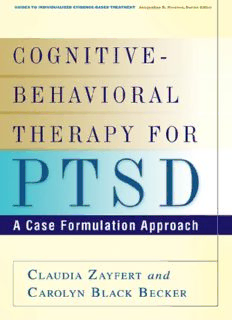
Cognitive-Behavioral Therapy for PTSD: A Case Formulation Approach (Guides to Individualized Evidence-Based Treatment) PDF
Preview Cognitive-Behavioral Therapy for PTSD: A Case Formulation Approach (Guides to Individualized Evidence-Based Treatment)
COGNITIVE-BEHAVIORAL THERAPY FOR PTSD Guides to Individualized Evidence-Based Treatment Jacqueline B. Persons, Series Editor Providing evidence-based roadmaps for managing real-world cases,volumes in this series help the clinician develop treatment plans using interventions of proven effectiveness.With an emphasis on systematic yet flexible case formulation,these hands-on guides provide powerful alternatives to one-size-fits-all approaches.Each book addresses a particular disorder or presents cutting-edge intervention strategies that can be used across a range of clinical problems. Cognitive Therapy of Schizophrenia David G.Kingdon and Douglas Turkington Treating Bipolar Disorder:A Clinician’s Guide to Interpersonal and Social Rhythm Therapy Ellen Frank Modular Cognitive-Behavioral Therapy for Childhood Anxiety Disorders Bruce F.Chorpita Cognitive-Behavioral Therapy for PTSD:A Case Formulation Approach Claudia Zayfert and Carolyn Black Becker Cognitive-Behavioral Therapy for PTSD A CASE FORMULATION APPROACH Claudia Zayfert Carolyn Black Becker Series Editor’s Note by Jacqueline B. Persons THE GUILFORD PRESS New York London ©2007TheGuilfordPress ADivisionofGuilfordPublications,Inc. 72SpringStreet,NewYork,NY10012 www.guilford.com Allrightsreserved Exceptasnoted,nopartofthisbookmaybereproduced,translated, storedinaretrievalsystem,ortransmitted,inanyformorbyanymeans, electronic,mechanical,photocopying,microfilming,recording,or otherwise,withoutwrittenpermissionfromthePublisher. PrintedintheUnitedStatesofAmerica Thisbookisprintedonacid-freepaper. Lastdigitisprintnumber: 9 8 7 6 5 4 3 2 1 LIMITEDPHOTOCOPYLICENSE Thesematerialsareintendedforuseonlybyqualifiedmentalhealthprofessionals. ThePublishergrantstoindividualpurchasersofthisbooknonassignablepermission toreproduceallmaterialsforwhichphotocopyingpermissionisspecificallygranted in a footnote. This license is limited to you, the individual purchaser, for use with yourownclientsandpatients.Itdoesnotextendtoadditionalcliniciansorpractice settings, nor does purchase by an institution constitute a site license. This license doesnotgranttherighttoreproducethesematerialsforresale,redistribution,orany other purposes (including but not limited to books, pamphlets, articles, video- or audiotapes, and handouts or slides for lectures or workshops). Permission to reproduce these materials for these and any other purposes must be obtained in writingfromthePermissionsDepartmentofGuilfordPublications. LibraryofCongressCataloging-in-PublicationData Zayfert,Claudia. Cognitive-behavioraltherapyforPTSD:acaseformulationapproach/ ClaudiaZayfert,CarolynBlackBecker. p.;cm.—(Guidestoindividualizedevidence-basedtreatment) Includesbibliographicalreferencesandindex. ISBN-13:978-1-59385-369-3(hardcover:alk.paper) ISBN-10:1-59385-369-6(hardcover:alk.paper) 1. Post-traumaticstressdisorder—Treatment. 2. Cognitive therapy. I. Becker,CarolynBlack. II. Title. III. Series. [DNLM: 1. StressDisorders,Post-Traumatic—therapy. 2. Cognitive Therapy—methods. 3. StressDisorders,Post-Traumatic— psychology. WM170Z39c2007] RC552.P67C6442007 616.85′21—dc22 2006027917 In memory of Sami —C. Z. In memory of Sue —C. B. B. About the Authors ClaudiaZayfert,PhD,aclinicalpsychologistandanAssociateProfessorofPsychiatry at Dartmouth Medical School, has been involved in treatment, research, and training related to posttraumatic stress disorder (PTSD) for over 15 years. She completed her doctoral degree at West Virginia University and was a Research Associate at the Na- tionalCenterforPTSD.Currently,sheisDirectoroftheAnxietyDisordersServiceand thePosttraumaticStressDisorderTreatmentProgramintheDepartmentofPsychiatry at Dartmouth Hitchcock Medical Center. Her primary interests include promoting the use of empirically supported treatments for anxiety disorders in clinical practice and understandingbarrierstotheirimplementation.Dr.Zayferthaspublishedextensively and presented at national and international conferences, and provides training and consultation regarding cognitive-behavioral treatments. CarolynBlackBecker,PhD,isanAssociateProfessorofPsychologyatTrinityUniver- sity,SanAntonio.TrainedatRutgersUniversity,Dr.Beckerisapracticingclinicalpsy- chologistwhospecializesinthetreatmentofPTSD,anxietydisorders,andeatingdisor- ders. She has over 14 years of experience with cognitive-behavioral treatments for a variety of anxiety disorders, including PTSD. The primary focus of her teaching, re- search, and clinical work is the implementation of scientifically supported prevention and treatment interventions in clinical settings. In addition to numerous publications onthesetopics,Dr.Beckerregularlypresentsatnationalandinternationalconferences and provides training and consultation to clinicians. vii Series Editor’s Note Thepersonwhohasposttraumaticstressdisorder(PTSD)typicallyhasahostofprob- lems.InadditiontoPTSD,thepersongenerallyhasseveralco-occurringdisordersand difficulties,suchasbulimianervosa,borderlinepersonalitydisorder,substanceabuse, chaoticandabusiverelationships,financialproblems,andmore.Althoughthetraumas thatcausedthePTSDarelongpast—andinpartbecausetheyaresolongpastandhave notbeentreated—theseindividuals’livesareoftenshattered,andtheyexperiencesig- nificant suffering and extensive disability. ThegoodnewsisthatseveraleffectivetreatmentsforPTSDhavebeendeveloped. Ironically,thedevelopmentoftheseeffectivetreatmentsforPTSDisalsothebadnews (Strosahl, 1998) because of all the questions they raise. The fact that multiple, similar cognitive-behavioral treatments are available can lead to confusion for the treatment provider,whohasdifficultysortingthroughthesetherapiestodeterminewhichareef- fective.Aresomemoreeffectivethanothers?Howdotheydiffer?WhichoneshouldI usetotreatthepatientwhoisinmyofficerightnow?Yourdifficultiesarecompounded when you focus on your patient’s multiple, co-occurring disorders and difficulties, whichraisethefollowingquestions:ShouldItreatthepatient’svariousdisordersand problemssequentially?Ifso,inwhatorder?OrshouldItreatthemsimultaneously?Is the answer to this question different for different patients? What strategy can I use to determine the answer to this question? Claudia Zayfert and Carolyn Black Becker answer all of these questions in this book.ToanswerthequestionsaboutthetreatmentofPTSDitself,theauthorsdescribe thevariousevidence-basedcognitive-behavioralmodelsofPTSDanddistillfromthem theiressentialingredients.Theauthorsdescribebothconditioningandcognitiveviews of the acquisition and maintenance of PTSD symptoms, and they describe cognitive- behavioral views of fear, panic, anxiety, and the many other emotions that commonly occurinPTSD(e.g.,anger,shame,guilt,andhopelessness).Theauthorsprovideforthe clinician reader a sophisticated understanding of cognitive-behavioral conceptualiza- tionsofPTSDatthelevelofgeneralprinciplesratherthanattheleveloftheprocedural details of the currently available treatment protocols. Zayfert and Becker propose that twobasicinterventions,exposureandcognitiverestructuring,areattheheartofeffec- tive cognitive-behavioral therapy for PTSD, and they describe those interventions in ix
